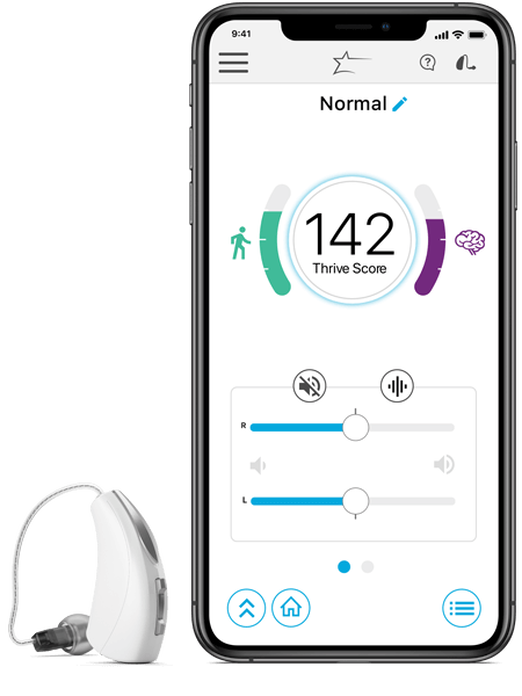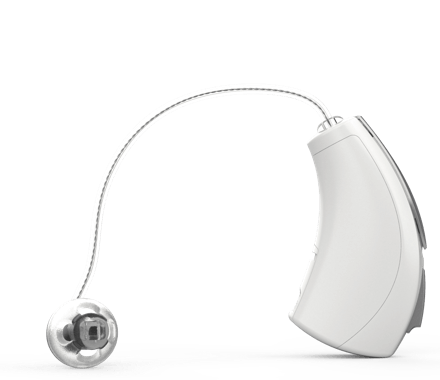|
There is so much research about the link between hearing loss and cognitive health, but there's still more research that needs to be done. What is known about hearing loss? Adults who suffer from hearing loss tend to display cases of steeper cognitive decline than those who have healthy hearing abilities. In one study, elderly adults who have hearing loss are at two-to-five times more likely to develop symptoms of dementia than those with normal hearing. In that same study, every 10 dB that was measured in hearing loss, there was a 20% rise in the possibility of developing dementia. Theories to these links Hearing loss that goes untreated for too long, may restrict the brain from collecting neural information. This is known as the "use-it-or-lose-it" theory. It is very important to keep your mind active by listening to sounds. Those who suffer from hearing loss may cut back on socializing with others. The worst combination of an increase in cognitive decline is being socially isolated, depressed and suffering from cognitive decline. The theory is that those who have hearing loss are less inclined to engage in social situations. This is what can cause depression and isolation, which can lead to cognitive decline. Attempting to listen and comprehend speech sounds requires a number of parts in your brain, including its working memory. When the brain is focused on listening, many of its other areas cannot be utilized anywhere else. How can hearing aids help? Hearing aids can stimulate the brain by allowing users to hear and interpret information. These devices can make people feel more confident and encourage them to participate in life again. This lowers their risks of depression and social isolation. Hearing aids can help reduce the cognitive strain that a person may use in order to listen. A study from 2015 showed a similar rate of cognitive decline between those who wore hearing aids, and those who did not need to wear hearing aids. It implied that wearing hearing aids can delay the development of cognitive decline. Starkey's Livio AI hearing aids not only provide a high-quality hearing experience, but they also use sensors and artificial intelligence to give you an assessment in regard to your cognitive health. Your Brain Score is measured on a daily basis Use Time - This measures the length of time that your hearing aids are worn. This is vital because wearing hearing aids helps to lower your chances of cognitive decline due to hearing loss. Engagement - This feature measures how much time is spent in environments where the hearing aid user has discussions with other people or streams phone calls. It helps the user participate more when in large groups. Actively Listening - This measures the different types of circumstances that the user encounters in their day. These different environments help stimulate brain development. The Thrive Hearing app can keep a record of your Brain Score to show how much progress you've made. Use it to observe and evaluate your cognitive health.  Pair Starkey's Livio AI with the Thrive Hearing app! Pair Starkey's Livio AI with the Thrive Hearing app! If you, or a loved one, would like a free trial of the Livio AI hearing aids, please contact us at Pure Sound Hearing Aids for a free hearing test and consultation.
0 Comments
Your comment will be posted after it is approved.
Leave a Reply. |
Categories
All
|
-
products
- Rexton Emerald M 8C RIC
- Rexton inoX CIC 8C
- Rexton Mosaic M 8C BTE
- Rexton Mosaic P 8C BTE
- Rexton Stellar RIC 8C
- Rexton Sterling 8C CIC / IIC
- Rexton Sterling 8C ITE / ITC
- Rexton Emerald XS 8C RIC
- Rexton Emerald S 8C RIC
- Signia Active Pro
- Signia CROS AX
- Signia CROS Hearing Solutions
- Signia Insio Charge&Go AX
- Signia Insio Nx IIC/CIC
- Signia Insio Nx ITC/ITE
- Signia Intuis 3 Family
- Signia Motion Charge&Go X
- Signia Motion 13 Nx/Motion 13 P Nx
- Signia Prompt
- Signia Pure Charge&Go AX & T AX
- Signia Pure 312 AX
- Signia Pure 10 Nx
- Signia Pure 13 BT
- Signia Pure 13 Nx
- Signia Silk X
- Signia Styletto AX
- Signia Styletto X
- SERVICES >
- about
- blog
- Insurance
- contact
|
© 2023 Pure Sound Hearing Aids. All Rights Reserved.
|
Proudly powered by Weebly
-
products
- Rexton Emerald M 8C RIC
- Rexton inoX CIC 8C
- Rexton Mosaic M 8C BTE
- Rexton Mosaic P 8C BTE
- Rexton Stellar RIC 8C
- Rexton Sterling 8C CIC / IIC
- Rexton Sterling 8C ITE / ITC
- Rexton Emerald XS 8C RIC
- Rexton Emerald S 8C RIC
- Signia Active Pro
- Signia CROS AX
- Signia CROS Hearing Solutions
- Signia Insio Charge&Go AX
- Signia Insio Nx IIC/CIC
- Signia Insio Nx ITC/ITE
- Signia Intuis 3 Family
- Signia Motion Charge&Go X
- Signia Motion 13 Nx/Motion 13 P Nx
- Signia Prompt
- Signia Pure Charge&Go AX & T AX
- Signia Pure 312 AX
- Signia Pure 10 Nx
- Signia Pure 13 BT
- Signia Pure 13 Nx
- Signia Silk X
- Signia Styletto AX
- Signia Styletto X
- SERVICES >
- about
- blog
- Insurance
- contact


 RSS Feed
RSS Feed